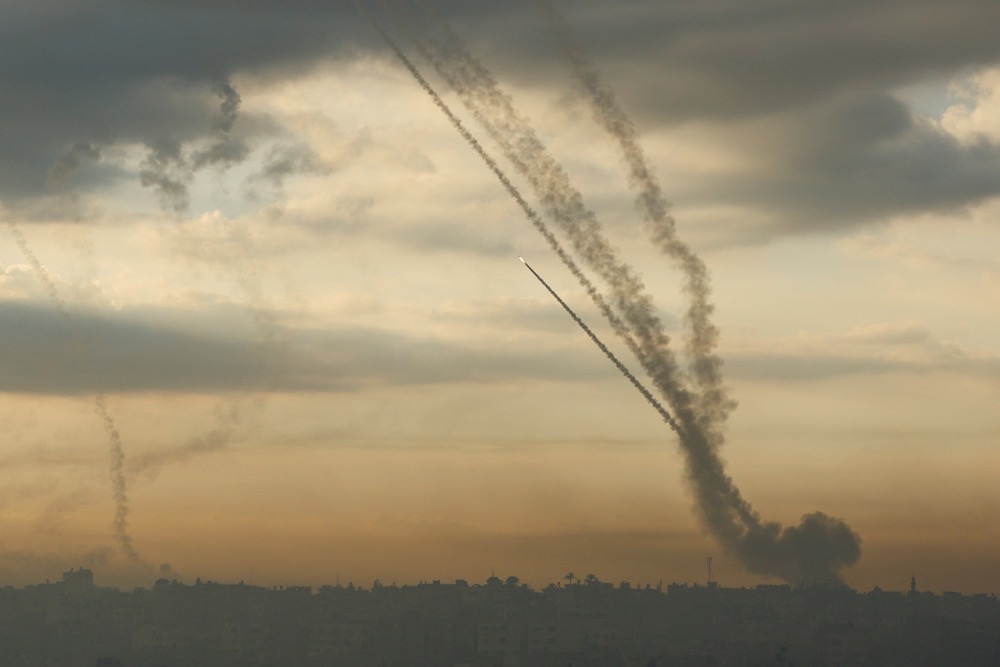BEIRUT: Israel faced accusations of violating the rules of engagement on Saturday after a military drone attacked a car in Khiara village in western Bekaa, killing the Lebanese driver.
Khiara, about 24 km from Shebaa Farms on the border and 58 km from Beirut, was targeted for the first time since the start of the conflict between Israel and Hezbollah.
A Lebanese security source said the drone strike on a SUV killed the driver, Ayman Ghotmeh, from Lala village in Bekaa.
Reports in Bekaa suggested that the victim had links with Hamas or was affiliated with a radical group allied with Hezbollah.
BACKGROUND
Since the Israel-Hamas war broke out on Oct. 7, Hezbollah movement and other groups allied with the Palestinian fighters have traded near-daily fire with Israel across the southern border.
The Israeli army later said that Ghotmeh was a commander in the Islamic Group in Lebanon, and “was in charge of supplying Hamas with weapons.”
According to Israeli media outlets, the army also targeted Hamas commander Raed Saad in a strike inside Gaza.
Israeli shelling reached Khiam, the outskirts of Deir Mimas, and Kfarkila amid continued confrontations with Hezbollah on Saturday, while Israeli warplanes struck Yaroun with two air-to-surface missiles, with no casualties reported.
Hezbollah said it struck a building used by Israeli soldiers in the Manara settlement.
It has also been reported that UNIFIL was fortifying its military positions in the border area.
Candice Ardell, deputy director of the UNIFIL Media Office, said that “the international forces reject the use of UNIFIL locations or nearby areas to carry out attacks through the Blue Line.”
In an official statement, Ardell said: “Since October, we’ve been witnessing many incidents targeting our locations and vehicles from both sides. In some situations, our peacekeepers sustained some injuries, which fortunately weren’t serious.
“We reiterate to all parties that targeting UN locations or using nearby areas to carry out attacks through the Blue Line is unacceptable and constitutes a violation” of UN Security Council Resolution 1701.
She added: “We have strong measures in place to ensure peacekeepers’ safety and ability to fulfill their duties. This includes updating our buildings when needed.”
The UNIFIL reaction came as Hezbollah parliamentary bloc member MP Hassan Ezzeddine said all the “pressure and intimidation on Lebanon is aimed at pressuring the resistance.”
Ezzeddine said: “We have faced threats and temptations, the aim of which was to give up our heavy weapons in favor of what we want inside Lebanon, but we refused and continued our path.
“The threats made by the enemy against Lebanon are to stop the front of northern occupied Palestine because this front, by everyone’s admission, especially the enemy’s leaders, is very influential in weakening them, paralyzing their capabilities, and preventing them from defeating Gaza.”
Ezzeddine addressed “all those working behind the scenes, and openly, those delegations coming to Lebanon with various initiatives,” saying: “Do not waste your time and efforts in Lebanon, because they are going in the wrong direction, and do not tire yourselves out.
“There is only one way, and that is to go to Israeli leaders and pressure them to stop their aggression on Gaza. Then, all fronts will calm down.
“But if this enemy continues its aggression and expands the scope of this war, the resistance is ready to fight a battle that may ultimately be decisive.”
The Hezbollah MP’s remarks came as the Kuwaiti Ministry of Foreign Affairs advised all its citizens to avoid travel to Lebanon due to security developments in the region.
The ministry asked “Kuwaiti citizens already in Lebanon, with no pressing reasons to remain, to leave the country as soon as possible. Those unable to leave must contact the Kuwaiti Embassy in Lebanon immediately via the embassy’s emergency phone number: 0096171171441.”
Kuwait Airways announced an increase in the capacity of its planes heading to Beirut to accommodate passengers wishing to return to Kuwait.
In a statement on its X account, the airline said: “These measures come in coordination with the Foreign Ministry in light of the current circumstances in the region.”





































